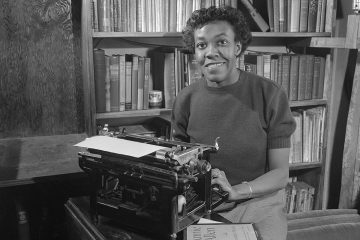Lovya Gyarkye in The New Republic:
 The opening lines of Gwendolyn Brooks’s epic “The Anniad” are, like the rest of the poem, deceptively uncomplicated. “Think of sweet and chocolate,” she writes:
The opening lines of Gwendolyn Brooks’s epic “The Anniad” are, like the rest of the poem, deceptively uncomplicated. “Think of sweet and chocolate,” she writes:
Left to folly or to fate, / Whom the higher gods forgot, / Whom the lower gods berate; / Physical and underfed / Fancying on the featherbed / What was never and is not
The poem, published in 1950, sweeps through the life of Annie Allen, an ordinary black girl who dreams of finding happiness and attaining self-consciousness in 43 stanzas. At the same time, Brooks details the social conditions that ensure Annie’s dreams remain unrealized, that force her to mature early, and ultimately leave her disillusioned. “The Anniad” takes place against the backdrop of World War II. While almost all Americans benefitted from the post-war boom—both economically and socially—African-Americans failed to reap the full benefits of a country still fraught with racial tensions. Annie Allen suffers the effects of the war: Her husband returns with post-traumatic stress disorder and a depressing awareness of the “white and greater chess” of America. He eventually abandons Annie, who is left “derelict and dim and done.”
…On a trip with fellow American writers to Kiev and Leningrad in 1982, Brooks was interviewed for an article called: “What It Means to Be Black.” During that interview Susan Sontag interrupted Brooks and began to give an answer. Brooks was taken aback. “Why do you turn from me to her with this question,” she said to the interviewer. “Obviously, being Black, I know more about what it means to be black than does she.” An enraged Sontag then told Brooks: “I turn my back upon you.” In this situation Jackson sees both Brooks’s “great sense of humor” and Sontag’s “sense of superiority and rage at her loss of white privilege to speak on behalf black people.”
More here. (Note: Throughout February, at least one post will honor The Black History Month. This year’s theme is “African Americans and the Vote.” Readers are encouraged to send in their suggestions)
